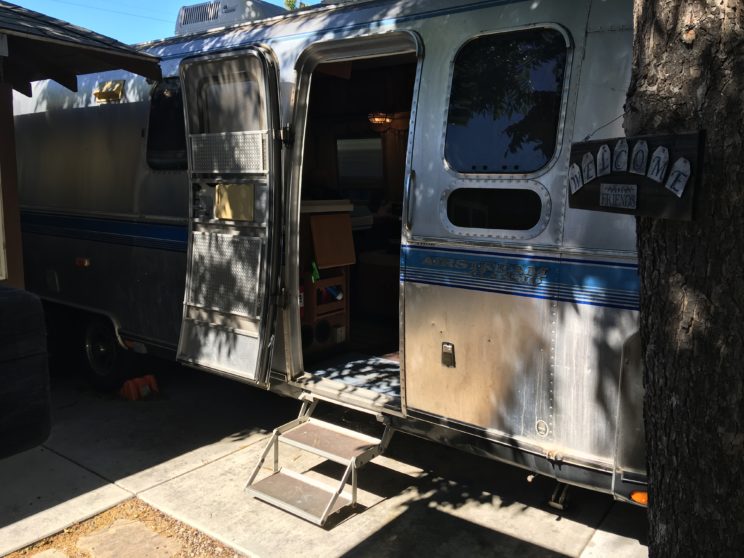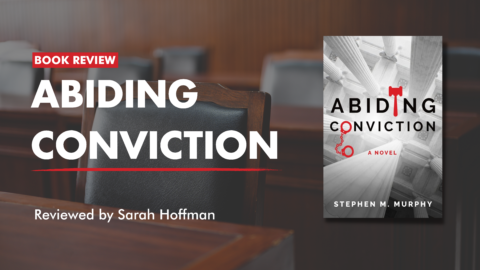This year, with all its challenges, has also given us an opportunity to pause and look back on the many people and stories from San Francisco Attorney magazine that have inspired and engaged.
Jennifer Smythe and Gary Dubrovsky, a married couple who are also partners in Dubrovsky Law, gave us a glimpse into their Airstream home office on wheels in 2016. Parked on the side of their house, the Airstream offered a fully equipped workspace complete with Wi-Fi, electricity, water, heat, air conditioning, and even its own bathroom. When the family needed a place for quiet and solitude, the Airstream saved the day. In times of COVID-19, their setup may look like a dream to those who have been sheltering in place for many months. We checked in with the couple to see how they are “Airstreaming Live” in 2020.
How has the pandemic changed your practice and how you work?
Jennifer Smythe: As two attorneys who routinely work from home, we were already set up to do so when the pandemic hit, thankfully. The Airstream was already a fully-functioning home office for Gary, so he spent the initial months of the pandemic there from 9 a.m. to 5 p.m. with a break for lunch and an episode of Ozark with me (i.e. a “partners meeting”).
As the courts scrambled to figure out how to function, Gary was able to continue working on his cases behind the scenes, speaking with clients by phone, Zoom, or Skype. Eventually, he started ‘appearing’ in court in the Airstream via Zoom or BlueJeans, wearing a suit on top and loungewear on the bottom. The photo you see here was his first Zoom court appearance. He opted for a full suit and flip-flops just to be safe. He is now back to visiting our San Francisco main office at least a few times a week, although he is still meeting with clients by phone or video mostly.
As you can imagine, family law—Gary’s field of practice—has seen a surge of activity amidst the pandemic as couples and families try to weather the 2020 storms that don’t let up. Gary has been busy helping his clients navigate new divorce decisions and complex custody issues in which parents are at extreme odds over returning to school in-person and general quarantine and exposure issues.
I worked exclusively from home pre-pandemic (inside our actual home and not the RV), so I just continued to do so during the pandemic. Although my daily office functioning wasn’t greatly affected, my practice area—immigration law—was turned upside down.
Between presidential proclamations on travel and global visa bans, I had clients stuck all over the world trying to get home to the U.S. I also had employers with employees stuck abroad or working from home, which posed new challenges under existing work visa laws. The USCIS offices that do green card and citizenship interviews and embassies and consulates worldwide were also closed for five months, so those cases froze while client anxiety levels persisted. Many embassies and consulates still remain closed, with exceptions for emergency appointments only.
Above all, 2020 has inspired me to accept far more pro bono and low bono humanitarian cases for those in need. I now represent military service members through the AILA Military Assistance Program and have taken international adoption cases, as well as special immigrant juvenile cases for unaccompanied minors.
Gary Dubrovsky: From my perspective, the Great Unknown is whether a physical office is even necessary at this point. Is anyone actually meeting with clients in-person these days? If the 1918 pandemic is any indication, life will return to normal once again eventually. So, based on that (coupled with inertia), we continue to maintain our physical office in San Francisco as we look forward to re-negotiating our lease to terms that will more closely reflect current market conditions.
One other reflection on what I’ve seen “in the trenches” of family law during this pandemic: Certainly and to no particular surprise, the pandemic has resulted in a dramatic uptick of domestic violence disputes. Not only that, but the severity of domestic violence is also much worse than before. There’s much more vindictiveness, physicality, and unrest in general.
But I’ve noticed something on the direct opposite end of the spectrum. People are actually capable of setting aside their differences and coming together to figure out a workable game-plan to accommodate what’s currently happening in the world. I have one case, a child custody/visitation matter. Since I was brought in to represent one of the parents several years ago, we were in court about once every couple months on average, wrangling over one thing or another. The parties could not agree on the time of day.
Mid-March of this year, the world stopped turning on its axis. All hearings were either taken off-calendar or rescheduled. I didn’t hear from this client for several months. Then, mid-summer, I learned that my client and the other parent actually sat down to discuss what was happening to their child and worked out their own plan to handle it. All my client wanted from me was to document their agreement to keep the court up-to-date. That’s currently my favorite story and keeps me optimistic.
Do you still maintain a home office in the Airstream trailer? Did it help make remote work easier in 2020?
Jennifer Smythe: Yes! The Airstream is a fully-functioning home office when it is not in the shop, which it is currently after we blew two tires and tore off the undercarriage on a COVID-19 RV trip to Humboldt County.
But yes, it makes everything easier when it is here. I learned during COVID-19 that Gary spends all day talking on the phone to staff, clients, opposing counsel, opposing parties, and specialists. I, on the other hand, work in silence and do most things by email. This “great maddening divide” is cured nicely by having a separate workspace on the property for Gary.
What advice can you share with working parents or people in shared living situations who need private space to effectively work from home?
Jennifer Smythe: First of all, working parents, I celebrate you! We have two small children who were fortunate enough to remain in school through this experience, minus two-and-a-half months of homeschooling our six-year-old, which was nightmarish in all ways (he did great—we were a wreck). My advice is to have, if possible, separate areas and workspaces that the children cannot touch. Mine is inside our master bedroom and the kids know to keep their paws off my desk and work station next to it (no exceptions). Similarly, the kids know to stay out of the trailer without an adult. For our son, we set up his homeschooling station in his room, which helped a lot because the door closes.
Whether you have kids, roommates, spouses, or other family living with you, any chance you have to work behind a closed door would be my advice. If everyone is home and you cannot think straight, I highly recommend work calls in your car, which I did many times during the homeschooling period. Flexibility and adaptability are key, with a big dose of silence (and evening cocktails) from time to time.
Many professionals have taken the opportunity of remote work this year to relocate or work while traveling. Have you taken the Airstream on the road recently, or are you planning to?
Jennifer Smythe: Yes! Early on in the pandemic, we took it to Humboldt for seven days to visit the Avenue of the Giants and unplug from social media and the news. The journey to get there was brutal with the blown tires referenced above, but the week was spectacular. We have fantasized about leaving with the kids on the road many times, but since they can attend school safely, we stay put for now.
Jennifer Smythe and Gary Dubrovsky are partners in Dubrovsky Law. Smythe specializes in immigration law focusing on U.S. employment and family-based immigration, including temporary nonimmigrant visas, permanent residents, and U.S. citizenship/naturalization. Dubrovsky is a family law attorney who focuses on complex property and child custody litigation.
To read Smythe and Dubrovsky’s account of their Airstream adventures, see the article from the Fall 2016 issue of San Francisco Attorney, available online at www.sfbar.org/wp-content/uploads/2020/11/airstreaming-live.pdf




